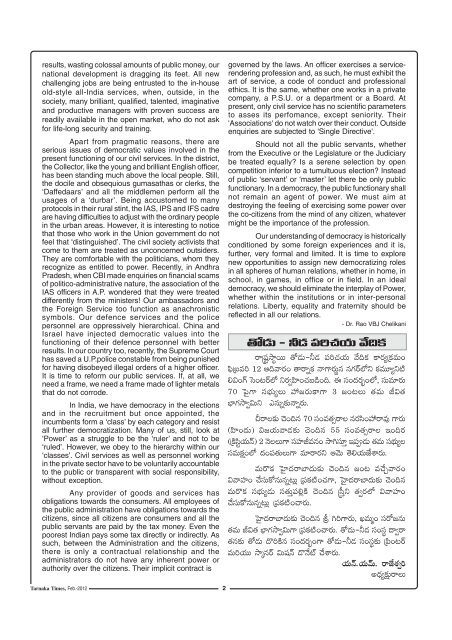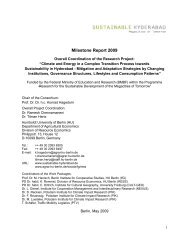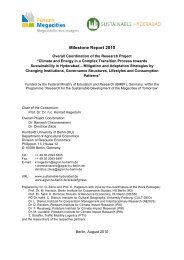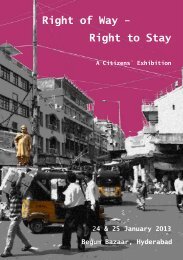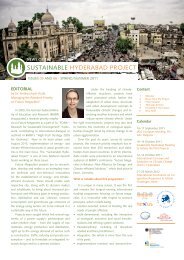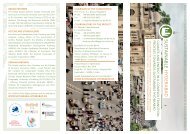tarnaka times - Sustainable Hyderabad
tarnaka times - Sustainable Hyderabad
tarnaka times - Sustainable Hyderabad
You also want an ePaper? Increase the reach of your titles
YUMPU automatically turns print PDFs into web optimized ePapers that Google loves.
esults, wasting colossal amounts of public money, our<br />
national development is dragging its feet. All new<br />
challenging jobs are being entrusted to the in-house<br />
old-style all-India services, when, outside, in the<br />
society, many brilliant, qualified, talented, imaginative<br />
and productive managers with proven success are<br />
readily available in the open market, who do not ask<br />
for life-long security and training.<br />
Apart from pragmatic reasons, there are<br />
serious issues of democratic values involved in the<br />
present functioning of our civil services. In the district,<br />
the Collector, like the young and brilliant English officer,<br />
has been standing much above the local people. Still,<br />
the docile and obsequious gumasathas or clerks, the<br />
‘Daffedaars’ and all the middlemen perform all the<br />
usages of a ‘durbar’. Being accustomed to many<br />
protocols in their rural stint, the IAS, IPS and IFS cadre<br />
are having difficulties to adjust with the ordinary people<br />
in the urban areas. However, it is interesting to notice<br />
that those who work in the Union government do not<br />
feel that ‘distinguished’. The civil society activists that<br />
come to them are treated as unconcerned outsiders.<br />
They are comfortable with the politicians, whom they<br />
recognize as entitled to power. Recently, in Andhra<br />
Pradesh, when CBI made enquiries on financial scams<br />
of politico-administrative nature, the association of the<br />
IAS officers in A.P. wondered that they were treated<br />
differently from the ministers! Our ambassadors and<br />
the Foreign Service too function as anachronistic<br />
symbols. Our defence services and the police<br />
personnel are oppressively hierarchical. China and<br />
Israel have injected democratic values into the<br />
functioning of their defence personnel with better<br />
results. In our country too, recently, the Supreme Court<br />
has saved a U.P.police constable from being punished<br />
for having disobeyed illegal orders of a higher officer.<br />
It is time to reform our public services. If, at all, we<br />
need a frame, we need a frame made of lighter metals<br />
that do not corrode.<br />
In India, we have democracy in the elections<br />
and in the recruitment but once appointed, the<br />
incumbents form a ‘class’ by each category and resist<br />
all further democratization. Many of us, still, look at<br />
‘Power’ as a struggle to be the ‘ruler’ and not to be<br />
‘ruled’. However, we obey to the hierarchy within our<br />
‘classes’. Civil services as well as personnel working<br />
in the private sector have to be voluntarily accountable<br />
to the public or transparent with social responsibility,<br />
without exception.<br />
Any provider of goods and services has<br />
obligations towards the consumers. All employees of<br />
the public administration have obligations towards the<br />
citizens, since all citizens are consumers and all the<br />
public servants are paid by the tax money. Even the<br />
poorest Indian pays some tax directly or indirectly. As<br />
such, between the Administration and the citizens,<br />
there is only a contractual relationship and the<br />
administrators do not have any inherent power or<br />
authority over the citizens. Their implicit contract is<br />
Tarnaka Times, Feb.-2012 2<br />
governed by the laws. An officer exercises a servicerendering<br />
profession and, as such, he must exhibit the<br />
art of service, a code of conduct and professional<br />
ethics. It is the same, whether one works in a private<br />
company, a P.S.U. or a department or a Board. At<br />
present, only civil service has no scientific parameters<br />
to asses its perfomance, except seniority. Their<br />
'Associations' do not watch over their conduct. Outside<br />
enquiries are subjected to 'Single Directive'.<br />
Should not all the public servants, whether<br />
from the Executive or the Legislature or the Judiciary<br />
be treated equally? Is a serene selection by open<br />
competition inferior to a tumultuous election? Instead<br />
of public ‘servant’ or ‘master’ let there be only public<br />
functionary. In a democracy, the public functionary shall<br />
not remain an agent of power. We must aim at<br />
destroying the feeling of exercising some power over<br />
the co-citizens from the mind of any citizen, whatever<br />
might be the importance of the profession.<br />
Our understanding of democracy is historically<br />
conditioned by some foreign experiences and it is,<br />
further, very formal and limited. It is time to explore<br />
new opportunities to assign new democratizing roles<br />
in all spheres of human relations, whether in home, in<br />
school, in games, in office or in field. In an ideal<br />
democracy, we should eliminate the interplay of Power,<br />
whether within the institutions or in inter-personal<br />
relations. Liberty, equality and fraternity should be<br />
reflected in all our relations.<br />
- Dr. Rao VBJ Chelikani<br />
`À_»∞ - h_» ÑïK«Ü«∞ "ÕkHõ<br />
~å¢+¨ìê÷~Ú `À_»∞-h_» ѨiK«Ü«∞ "ÕkHõ HÍ~°º„Hõ=∞O<br />
Ñ≤„|=i 12 Pk"å~°O `å~åflHõ


